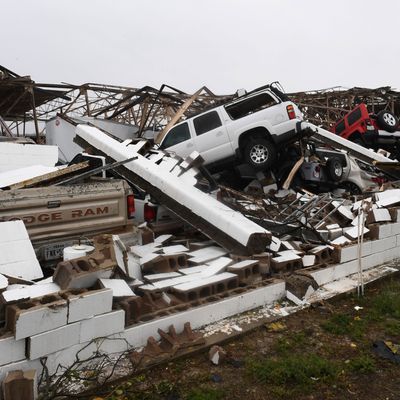
The devastation spreading through southeast Texas and beyond thanks to Tropical Storm Harvey is creating yet another must-do item for Congress in September: providing funds for what is likely to be a hugely expensive disaster response and recovery bill.
The Federal Emergency Management Agency says the storm’s rampage is “quickly drawing down the remaining balance” in the agency’s dwindling cache of disaster assistance funding.
With $3.3 billion left in the Disaster Relief Fund, FEMA is expected to soon switch to full emergency mode, pinching pennies on other projects to make the money last for response to Harvey.
The president, as presidents who remember what Katrina did to George W. Bush will likely do for the foreseeable future, has made a lot of noise about ensuring a full and speedy federal response to take care of Harvey’s victims and begin the massive task of reconstruction:
“I think you’re going to see very rapid action from Congress, certainly from the president. You’re going to get your funding,” Trump said at a news conference. “I’ve already spoken to Congress, and everybody feels for you.”
From one perspective, the need to deal with Harvey’s aftermath might appear to be an unwelcome complication for Congress, which has about two years’ worth of chores to get done this fall against a backdrop of legislative failure. But it could also provide a heaven-sent vehicle for debt-limit and spending measures due by September 30 that might otherwise create an economic and political disaster.
The Hill indicates congressional leaders are already thinking about exploiting Harvey relief and recovery to craft a big fat bill that can’t be stopped:
GOP leaders seeking a way out of their September logjam are talking about tying a disaster aid bill for Hurricane Harvey to a larger measure funding the government and raising the nation’s borrowing limit.
Including the disaster aid would almost certainly win some Republican votes for the package, which will otherwise be unpopular with GOP lawmakers who oppose a “clean” debt-ceiling hike and would like to impose restrictions on government spending.
The Texas House delegation alone has 25 members, some of whom would otherwise be likely troublemakers on the debt limit and/or appropriations, along with Texas senator Ted Cruz. Putting disaster money into the mix would also solidify Democratic votes for a jumbo package.
The most interesting factor, of course, is Donald Trump, whose eager advocacy of big bucks for the places and people hurt by Harvey is in sharp contrast to his multiple threats to shut down the government if the appropriations bill needed to keep federal operations humming beyond September 30 does not include funding for his border wall. Asked about the possibility of Harvey funds being packaged with a stopgap appropriations measure, Trump once again betrayed his lack of understanding about how things work in Congress:
The president batted down suggestions that delivering emergency funding to Texas would be hurt by his threats to shut down the government if a spending package doesn’t contain funding for his border wall.
“It has nothing to do with it, really. I think this is separate,” Trump said. “This is going to go very, very quickly. Everybody feels the same way I do.”
Yes, and that’s why disaster relief could be the little engine that pulls a great big legislative package onto Trump’s desk. The best guess is that Paul Ryan and Mitch McConnell will convince the president that he can have his hissy fit over the border wall later in the year, when a stopgap appropriations measure would expire. Among other merits of this approach, the debt-limit increase, which is the main object of House Freedom Caucus demands for spending cuts at the moment, can sneak through.
It’s all iffy, though. The mentality of hostage-takers is to glory in the number and importance of hostages taken. So in theory anyone — House conservatives, Democrats, or Donald J. Trump — wanting to get something controversial done as part of a deal on September’s must-pass legislation might simply view disaster money as another pressure point to exploit. But for the first time, there is some clear light at the end of September’s dark tunnel, and it is being created, ironically, by the dark skies over Houston.






























